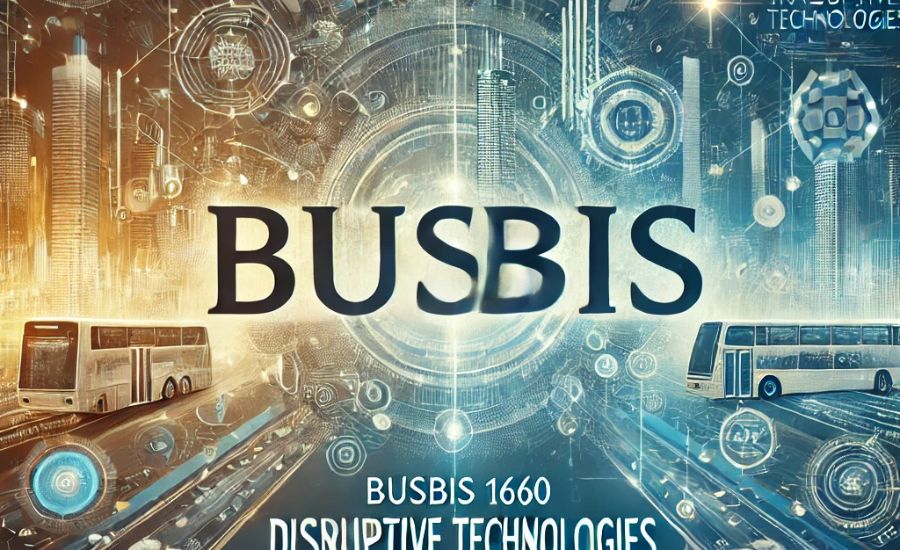Introduction to Busbis 1660 Disruptive Technologies
We are living in an era defined by a technological revolution, where disruptive innovations are transforming industries, reshaping consumer habits, and addressing challenges that once seemed impossible to overcome. Disruptive technologies go beyond merely enhancing existing solutions; they introduce entirely new paradigms that redefine the rules of the game. These technologies have the potential to revolutionize entire sectors and the way we live and work.
Busbis 1660 stands at the forefront of this transformation, recognized as a leader in harnessing cutting-edge technologies that establish new industry standards. Understanding the impact of disruptive technologies is crucial for businesses to stay competitive in this rapidly changing world. For individuals, staying informed is key to adapting to the evolving technological landscape. In this article, we will explore what disruptive technologies are, how Busbis 1660 is embracing innovation, and the profound effects these advancements have on global industries.
What Are Disruptive Technologies?

Definition
Disruptive technologies are innovations that fundamentally change the way industries, markets, and societies operate. Unlike conventional technologies that tend to enhance existing systems or products, disruptive technologies introduce entirely new methods, solutions, or business models. These innovations often challenge established norms by addressing unmet needs, lowering costs, or making products and services more accessible to a wider audience.
A prime example of disruptive technology is the shift from physical music CDs to digital streaming services. Rather than just improving how music was delivered, streaming revolutionized the way people access and experience music, making it more convenient and accessible, while fundamentally altering the entire music industry landscape. Disruptive technologies often create new markets and reshape existing ones, fostering innovation and driving societal change in unexpected ways.
Key Features of Disruptive Technologies
1. Accessibility:
One of the hallmark characteristics of disruptive technologies is their ability to make once-exclusive solutions available to a broader audience. By addressing previously unmet needs, these innovations enable people across various demographics to access advanced products and services. A notable example is ride-sharing apps, which have transformed the way people commute, making transportation more affordable and convenient for the general public, compared to traditional taxi services.
2. Affordability:
Disruptive technologies often lower the financial barriers that once limited access to advanced tools and services. By driving down costs, these innovations make cutting-edge technologies accessible to individuals and businesses alike. For instance, the rise of cloud computing has provided small businesses and startups access to high-powered computing tools and enterprise-grade software without the hefty upfront investment traditionally required.
3. Scalability:
These technologies are built to grow and evolve with industries, offering solutions that can be adapted to meet a wide range of needs. A prime example is the internet itself. Initially designed for academic purposes, the internet has since become indispensable in various sectors, including communication, entertainment, e-commerce, and more, proving its scalability and ability to reshape countless industries across the globe.
The Importance of Disruptive Technologies in Today’s World
In the rapidly evolving digital landscape, staying ahead of disruptive technologies is no longer optional—it is crucial for both businesses and individuals. Companies that fail to adapt to these changes risk becoming obsolete, as evidenced by the downfall of video rental giants like Blockbuster. In contrast, businesses that embraced digital disruption, such as Netflix, have not only survived but thrived by evolving with new technological trends.
For individuals, understanding disruptive technologies is equally important. It provides a competitive edge in navigating career shifts, acquiring new skills, and remaining relevant in an ever-changing job market. By staying informed about emerging trends, individuals can make strategic career choices and ensure they remain in demand in a technology-driven economy.
Overview of Busbis 1660
Introduction to Busbis 1660
Busbis 1660 represents a hallmark of innovation, growth, and forward-thinking solutions in today’s tech-driven world. The organization is committed to harnessing the power of disruptive technologies to address real-world challenges and unlock new opportunities across industries. With its dedication to blending creativity with cutting-edge technology, Busbis 1660 aims to empower both individuals and businesses by offering transformative solutions that drive success and progress.
Evolution and Growth
Since its inception in 1660, Busbis has evolved from a modest venture into a leading force in the technology industry. Initially focused on harnessing emerging technologies, the company quickly garnered attention for its ability to solve complex industry problems with innovative solutions. Over time, it expanded its reach and invested heavily in research and development. As a result, Busbis 1660 has built a reputation as a global leader in technological innovation, influencing sectors ranging from healthcare to finance and beyond. Today, the company continues to shape industries and inspire change worldwide.
Key Areas of Focus at Busbis 1660
Busbis 1660 is dedicated to advancing disruptive innovation across several vital sectors that drive positive change and transform industries. Its strategic focus includes:
- Artificial Intelligence (AI): Busbis 1660 is at the forefront of developing AI-driven technologies that enhance decision-making processes, improve operational efficiency, and deliver highly personalized experiences for users. By integrating machine learning and data analytics, the company is enabling smarter solutions that are reshaping industries.
- Internet of Things (IoT): The company is creating interconnected ecosystems that improve the efficiency and functionality of everyday processes. Whether in homes, cities, or businesses, Busbis 1660’s IoT solutions are optimizing workflows, streamlining operations, and contributing to smarter, more responsive environments.
- Sustainability: Recognizing the urgency of climate change, Busbis 1660 is dedicated to pioneering sustainable, eco-friendly technologies. The company focuses on creating solutions that reduce environmental impact, promote clean energy alternatives, and address the global need for more sustainable practices.
Achievements and Industry Recognition
Busbis 1660’s unwavering commitment to excellence has not gone unnoticed. The company has received numerous awards for innovation and leadership within the tech industry. Its transformative solutions have earned the company widespread recognition, positioning it as a leader in the space. By forging strategic partnerships with top-tier global companies, Busbis 1660 continues to strengthen its role as a driving force in technological advancements and global innovation.
How Disruptive Technologies Are Shaping the Future
Artificial Intelligence (AI)
Artificial Intelligence has transitioned from a futuristic idea to an essential component of various industries today. In healthcare, AI-driven systems are enhancing diagnostic accuracy and assisting with treatment strategies, helping healthcare professionals make better decisions. In finance, AI algorithms are streamlining investment decisions, detecting fraud, and managing risks more effectively. As a leader in AI innovation, Busbis 1660 is developing cutting-edge AI solutions that optimize business operations, helping companies of all sizes boost efficiency and achieve precision.
Internet of Things (IoT)
The Internet of Things (IoT) is revolutionizing the way devices communicate and work together. IoT-enabled smart homes are automating daily tasks, from temperature control to security, providing comfort and convenience. Similarly, smart cities use IoT technologies to enhance resource management, reduce energy waste, and improve urban living. Busbis 1660 is driving innovation in IoT by creating interconnected solutions that elevate productivity, streamline operations, and minimize inefficiencies across various sectors.
Blockchain Technology
Blockchain technology is transforming industries by offering a secure, transparent, and immutable method of storing and transferring data. In finance, blockchain ensures secure transactions and builds trust among stakeholders, while in supply chain management, it provides transparent tracking of goods and ensures authenticity. Busbis 1660 is utilizing blockchain technology to develop tamper-proof systems, which not only enhance security but also drive efficiency in industries that rely on reliable, accountable data management.
Green Energy Solutions
As the world confronts climate change, renewable energy has become a priority for sustainability. Busbis 1660 is actively contributing to this global movement by developing advanced solar and wind energy solutions. These innovations are designed to make renewable energy sources more efficient and accessible, supporting the transition to cleaner, more sustainable energy systems. By promoting green energy technologies, Busbis 1660 is helping to shape a future focused on environmental preservation and sustainability.
Robotics and Automation
Robotics and automation are increasingly integral to industries like manufacturing, logistics, and healthcare. Robots are transforming assembly lines, enhancing productivity and precision while reducing costs. In healthcare, robotics is enabling complex surgeries with higher accuracy and faster recovery times. Busbis 1660’s robotics solutions have optimized processes across multiple industries, driving both cost reductions and improvements in operational efficiency.
Quantum Computing
Quantum computing stands at the frontier of technological advancement, offering the potential to solve problems that were previously considered insurmountable. Though still in its early stages, quantum computing is expected to revolutionize industries like cryptography, pharmaceuticals, and materials science by solving complex problems at incredible speeds. Busbis 1660 is investing in quantum research, preparing for a future where this powerful technology will address challenges across a wide range of sectors.
In summary, these disruptive technologies are not only reshaping industries but also creating new opportunities for innovation and growth. As companies like Busbis 1660 continue to drive these advancements, the future holds vast potential for improvements in efficiency, sustainability, and security across all sectors.
Benefits of Implementing Busbis 1660 Disruptive Technologies
Operational Advantages
1. Enhanced Efficiency
Adopting disruptive technologies from Busbis 1660 brings significant improvements in efficiency across various operations. By streamlining workflows, businesses can reduce bottlenecks and accelerate processes, ultimately leading to faster product or service delivery. These technologies also minimize the need for manual intervention, allowing employees to focus on more strategic tasks, enhancing overall productivity.
2. Cost Savings
Implementing cutting-edge technologies helps reduce operational expenses by automating tasks that would otherwise require substantial human labor. This not only lowers the cost of workforce management but also minimizes human errors that can lead to costly mistakes. Additionally, Busbis 1660’s solutions help reduce maintenance costs by improving the reliability and longevity of equipment, ensuring resources are utilized more effectively.
3. Optimized Resource Allocation
By leveraging data-driven insights and intelligent systems, businesses can optimize the allocation of resources such as time, materials, and human capital. This reduces waste and ensures that resources are used where they are needed most, contributing to more efficient and sustainable operations.
Challenges and Solutions
1. Implementation Challenges
While the adoption of disruptive technologies from Busbis 1660 offers numerous benefits, organizations often face resistance and technical challenges during the initial implementation phase. These hurdles can arise from various factors such as a lack of familiarity with the new systems, integration difficulties, or concerns about the disruption of established workflows. However, with careful planning, clear communication, and well-executed strategies, businesses can effectively navigate these challenges. Taking a phased approach to implementation, involving training for employees, and providing adequate support can ensure a smoother transition and help organizations unlock the full potential of these advanced technologies.
2. Risk Management
The adoption of new technologies always involves inherent risks, especially when integrating them into existing systems. To mitigate these risks, organizations must prioritize the development of comprehensive security protocols and compliance measures. This includes implementing robust cybersecurity frameworks, conducting regular audits, and ensuring compliance with industry regulations. By adopting these practices, businesses can not only safeguard their data and intellectual property but also ensure the smooth integration of disruptive technologies without compromising operational integrity or user trust.
Future Prospects and Trends
Emerging Applications
The future of disruptive technologies, particularly those developed by Busbis 1660, is brimming with exciting possibilities. New applications are continuously emerging across a variety of sectors, such as the development of smart cities that optimize urban living and personalized healthcare solutions that cater to individual needs. The ongoing expansion of these technologies holds great promise, driving innovation and unlocking opportunities that were once considered unattainable.
Market Growth Predictions
According to industry experts, the adoption of disruptive technologies is poised for substantial growth in the coming years. This surge in adoption is expected to reshape industries, revolutionize business models, and introduce new job opportunities in sectors that embrace these innovations. As these technologies become increasingly integral to operations across various domains, the demand for skilled professionals and solutions is set to rise significantly.
Best Practices for Implementation
Strategic Planning
Successfully implementing disruptive technologies from Busbis 1660 requires a well-thought-out strategy. Companies must plan meticulously, ensuring that the adoption of new technologies aligns with their broader business objectives. This includes assessing resource availability, understanding technical capabilities, and anticipating potential challenges. Strategic planning not only sets a clear direction but also helps manage the complexities of integrating cutting-edge solutions into existing processes.
Training and Development
For organizations to truly reap the benefits of disruptive technologies, investment in employee training is essential. Ensuring that teams are equipped with the necessary skills and knowledge to work with these advanced tools maximizes their impact. Training programs should focus on building expertise, improving adaptability, and enhancing overall proficiency. By fostering a culture of continuous learning, businesses can ensure that their workforce remains agile and capable of leveraging innovative technologies to drive success.
Measuring Success and Return on Investment (ROI)
Performance Metrics
To assess the effectiveness of implementing Busbis 1660’s disruptive technologies, it is crucial to establish clear and measurable performance metrics. These metrics should focus on key aspects such as operational efficiency, cost savings, and improvements in customer satisfaction. By tracking these indicators, organizations can evaluate the tangible benefits of the technology and ensure it is contributing positively to their overall performance.
Long-term Value Creation
While immediate gains from adopting disruptive technologies are important, organizations must also focus on long-term value creation. This involves fostering a culture of continuous innovation and improvement. By constantly refining technological capabilities and adapting to changing market dynamics, businesses can sustain growth and ensure lasting success. The long-term vision should prioritize not only short-term efficiency but also the ability to stay ahead in a competitive and rapidly evolving landscape.
Final Thoughts
Disruptive technologies are reshaping industries and changing the way businesses operate. Embracing these innovations, especially those developed by leaders like Busbis 1660, offers immense potential to improve efficiency, drive growth, and stay competitive. However, successful implementation requires strategic planning, investment in employee development, and the ability to adapt to rapid changes. As we move forward, it’s clear that these technologies will continue to transform the world, presenting new opportunities for businesses and individuals alike.
Frequently Asked Questions (FAQs)
- What are disruptive technologies?
Disruptive technologies are innovations that significantly alter industries or markets by providing new solutions that replace or enhance existing methods. These technologies address previously unmet needs, create cost-effective alternatives, or offer greater accessibility. - How can businesses benefit from disruptive technologies?
By adopting disruptive technologies, businesses can improve efficiency, reduce costs, increase productivity, and offer more innovative products or services. These technologies can also enhance customer satisfaction and provide a competitive edge in rapidly changing markets. - What difficulties do businesses have when putting disruptive technology into practice?Challenges include resistance to change, initial high costs, the need for proper training, and integrating new systems into existing operations. Risk management and ensuring data security are also crucial in mitigating these challenges.
- How does Busbis 1660 contribute to technological advancement?
Busbis 1660 is at the forefront of developing and implementing disruptive technologies such as AI, IoT, blockchain, and green energy solutions. The company focuses on creating impactful innovations that solve real-world problems, improve business operations, and contribute to a sustainable future. - What are the future trends in disruptive technologies?
Emerging technologies such as AI, quantum computing, IoT, and blockchain are expected to continue evolving and gaining widespread adoption. These technologies will revolutionize industries like healthcare, finance, energy, and more, creating new job opportunities and reshaping business models.
Key Facts
- Disruptive technologies are not just incremental improvements; they redefine existing business models and create new markets.
- Artificial intelligence, IoT, and blockchain are leading disruptive technologies with the potential to transform industries across the globe.
- Busbis 1660’s innovations, including AI-driven solutions and sustainable energy technologies, are designed to improve operational efficiency, reduce costs, and drive long-term growth.
- Companies that embrace disruptive technologies early on tend to have a competitive advantage, improving customer satisfaction and operational efficiency.
- The global market for disruptive technologies is expected to grow exponentially in the coming years, with vast opportunities for innovation and job creation.
By understanding and implementing disruptive technologies, businesses and individuals can ensure they remain at the cutting edge of innovation, positioning themselves for success in an ever-evolving landscape.
For more Information About Technology visit bloghives




